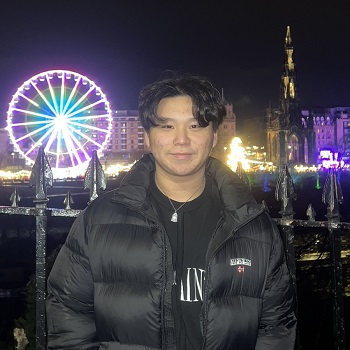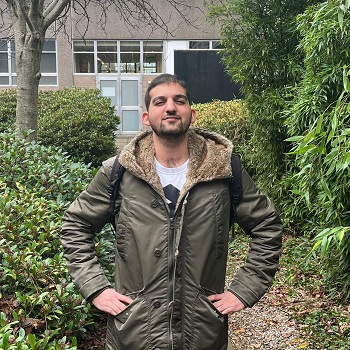 Hi I’m Marcus, a Y4 medical student, and part of the Edinburgh HealthTech and MedTech Society. We’re a multidisciplinary group of students, with representation from Medicine, Computer Science, Biomedical Sciences, Bioengineering, and Electrical Engineering courses at the University of Edinburgh. The aim of our society is to provide an opportunity to other students to learn about the robust developments in the Healthtech innovation space, and encourage them to find solutions for unmet clinical needs.
Hi I’m Marcus, a Y4 medical student, and part of the Edinburgh HealthTech and MedTech Society. We’re a multidisciplinary group of students, with representation from Medicine, Computer Science, Biomedical Sciences, Bioengineering, and Electrical Engineering courses at the University of Edinburgh. The aim of our society is to provide an opportunity to other students to learn about the robust developments in the Healthtech innovation space, and encourage them to find solutions for unmet clinical needs.
I set up this society alongside my co-president Cameron Peattie (Y4 Medicine) and vice-president Thomas Fawcett (Y4 Medicine) because we are all continuously amazed by new technologies in healthcare, whether they be useful in a preventative, diagnostic, or curative setting.
An example of some recent med and health tech development which I think is amazing is robotic percutaneous coronary intervention (PCI), as I have recently developed an interest in cardiology, alongside its catheterisation laboratory procedures. This was amazing to see in person and serves benefit for the operator and the patient.
A cross-university team enthusiastic for medical innovation
 Teaming up with like-minded students across the university with an equal enthusiasm for medical innovation and desire to explore technological developments in healthcare is great. As a committee, and currently a society with ~ 50 members, we aim to deliver a series of insightful academic talks and a Multidisciplinary Hackathon (in affiliation to the National MedTech Foundation). We are hoping to have more medical students getting involved, especially for next year’s committee, so do sign up as a member to get an insight into our operations!
Teaming up with like-minded students across the university with an equal enthusiasm for medical innovation and desire to explore technological developments in healthcare is great. As a committee, and currently a society with ~ 50 members, we aim to deliver a series of insightful academic talks and a Multidisciplinary Hackathon (in affiliation to the National MedTech Foundation). We are hoping to have more medical students getting involved, especially for next year’s committee, so do sign up as a member to get an insight into our operations!
“Through EUHMS, we have the opportunity to organise events and inform the student body of ground-breaking innovations in fields such as biofabrication, enabling the delivery of more human-like, better predictive organ models with an impact in our understanding of human physiology and disease, propelling drug development efforts. Moreover, with bioprinting companies on the rise, we hope in the 21st century to experience the introduction and establishment of 3D printed organ transplants. I wish someone talked to me about the potential and future of medical technologies when I first joined the University of Edinburgh – through this society we hope to achieve just that.”
Demetris Gregoriou Y5 Electronical and Electrical Engineering
“ As an electrical and mechanical engineering student, I am particularly interested in the healthtech and medtech industries, as the knowledge and skills acquired through my degree can be utilized to innovate technologies that have the potential to significantly improve people’s lives. I joined the Edinburgh University HealthTech and MedTech Society (EUHMS) to have the opportunity of attending informative talks and network with individuals who share similar interests.”
As an electrical and mechanical engineering student, I am particularly interested in the healthtech and medtech industries, as the knowledge and skills acquired through my degree can be utilized to innovate technologies that have the potential to significantly improve people’s lives. I joined the Edinburgh University HealthTech and MedTech Society (EUHMS) to have the opportunity of attending informative talks and network with individuals who share similar interests.”
Salvador Campos Y4 Electrical and Mechanical Engineering
As mentioned by my fellow committee members’ input to this blog, developments in healthtech and medtech sectors require a collaborative approach. For example, it is unlikely a medic will have much proficiency in engineering concepts, fluid mechanics or be able to code and build robots. I think it’s important that medics work together with people from other disciplines on this area from an early stage, to increase the probability of solving complex problems.
Our society aims to encourage medical students to think creatively, reflect on unmet clinical needs and learn to think collaboratively with students study other academic courses to tackle these problems. Of course, this society is also more than welcome to students who are interested in learning a bit more about developments in the healthcare technology space.
Join Edinburgh HealthTech and MedTech Society
If you this sounds like something you’d be interested in, don’t hesitate to get in touch. You can join our society for free.
We will be making a mailing list for our EUSA members – and you can follow us and find out more via our social media platforms.
Follow us on our social media platforms


